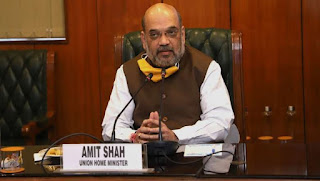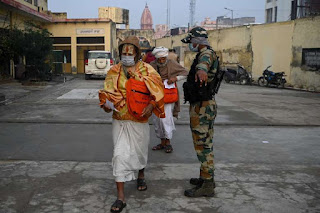Shehbaz gets his cabinet, foreign minister
New Delhi
After days of rumblings and dilly-dallying, Pakistan Prime Minister Shehbaz Sharif finally could get his cabinet sworn in.
Senate Chairman Sadiq Sanjrani administered the oath to 37 today federal ministers and ministers of state, 'Dawn' and other Pakistani media reported on Tuesday.
There were 31 federal ministers and three ministers of state and as many advisers to the new Prime Minister.
As expected, Sharif's PML (N) walked away with sizable representation in the new ministry that replaced Imran Khan's regime.
Khan's was the first dispensation that was voted out of office in Parliament or Pakistan's National Assembly.
Federal ministers
Khawaja Muhammad Asif (PML-N)
Ahsan Iqbal (PML-N)
Rana Sanaullah (PML-N)
Sardar Ayaz Sadiq (PML-N)
Rana Tanveer Hussain (PML-N)
Khurram Dastgir Khan (PML-N)
Marriyum Aurangzeb (PML-N)
Khawaja Saad Rafique (PML-N)
Miftah Ismail (PML-N)
Javed Latif (PML-N)
Riaz Hussain Pirzada (PML-N)
Murtaza Javed Abbasi (PML-N)
Azam Nazeer Tarar (PML-N)
Syed Khursheed Shah (PPP)
Syed Naveed Qamar (PPP)
Sherry Rehman (PPP)
Abdul Qadir Patel (PPP)
Shazia Marri (PPP)
Syed Murtaza Mahmud (PPP)
Sajid Hussain Turi (PPP)
Ehsan Ur Rehman Mazari (PPP)
Abid Hussain (PPP)
Asad Mahmood (MMA)
Abdul Wasay (MMA)
Abdul Shakoor (MMA)
Muhammad Talha Mahmood (JUI)
Aminul Haque (MQM-P)
Faisal Sabzwari (MQM-P)
Muhammad Israr Tareen (BAP)
Shahzain Bugti (JWP)
Tariq Bashir Cheema (PML-Q)
Ministers of state
Aisha Ghaus Pasha (PML-N)
Abdul Rehman Khan Kanju (PML-N)
Hina Rabbani Khar (PPP)
Advisers to the PM
Qamar Zaman Kaira (PPP)
Amir Muqam (PML-N)
Awn Chaudhry (PTI's Tareen group)
According to a statement issued by the President House, PML-N's Khawaja Muhammad Asif, Ahsan Iqbal, Rana Sanaullah, Sardar Ayaz Sadiq, Rana Tanveer Hussain, Khurram Dastgir Khan, Marriyum Aurangzeb, Khawaja Saad Rafique, Miftah Ismail, Javed Latif, Riaz Hussain Pirzada, Murtaza Javed Abbasi and Azam Nazeer Tarar took the oath as federal ministers.
From the PPP, Syed Khursheed Shah, Syed Naveed Qamar, Sherry Rehman, Abdul Qadir Patel, Shazia Marri, Syed Murtaza Mahmud, Sajid Hussain Turi, Ehsan Ur Rehman Mazari and Abid Hussain took the oath as federal ministers.
Asad Mahmood, Abdul Wasay and Abdul Shakoor of the Muttahida Majlis-i-Amal, Jamiat Ulema-e-Islam Pakistan Senator Muhammad Talha Mahmood, Muttahida Qaumi Movement-Pakistan's Aminul Haque and Faisal Sabzwari, Balochistan Awami Party's Muhammad Israr Tareen, Jamhoori Watan Party's Nawabzada Shahzain Bugti and Pakistan Muslim League-Quaid's Tariq Bashir Cheema are also among the newly appointed federal ministers.
(UCAN report)
Link
Hindi as the national language suits the BJP's wider agenda of establishing a nation of and for Hindus
Home Minister Amit Shah, a trusted aide of Prime Minister Narendra Modi, has come all out in support of Hindi as the official language of communication across a multilingual India.
Hindi is the mother tongue of around 40 percent of Indians in the northern belt while the rest of its citizens speak over 120 other languages, with English serving as the crucial bridge.
Shah made it clear that Hindi should become an “alternative to English” and not the other Indian languages. He wants non-Hindi speakers to start using Hindi while communicating with each other.
He also suggested making Hindi flexible by accepting words from other Indian languages to help propagate it.
Leaders from Hindi-speaking northern India have been pushing to make Hindi the national language for a long time, hoping to further endear themselves to their voters.
But Shah’s remarks at a recent meeting of the parliamentary official language committee are a bit baffling. There is perhaps a communal angle here. The Bharatiya Janata Party (BJP) believes in "one nation, one religion, one language and one culture."
And since the latest push for Hindi is coming from someone who is arguably India’s second most powerful man after Modi, there is a cause for worry.
Even a Christian-dominated state like Nagaland in the country’s northeast corner felt the need to clarify that Hindi was taught as a compulsory language only up to class eight as part of the three-language formula, which promotes the local or provincial languages along with English and Hindi across the country.
Interestingly, the BJP is part of the ruling combine in Nagaland, which is the only Indian state with English as its official language due to the lack of a single Naga tongue.
Nagaland goes to polls early next year along with other non-Hindi states like Meghalaya and Tripura in its neighborhood and Karnataka in the south.
Mizoram, another Christian-dominated state in the northeast, also clarified it cannot make Hindi compulsory beyond eighth grade in schools. All eight northeastern states are visibly alarmed by Shah’s claim that they had agreed to teach Hindi up to 10th grade.
There is strong opposition to the imposition of Hindi among the southern states too. The northern language belonging to the Indo-Aryan family will face the strongest opposition in the south, which proudly speaks Dravidian languages and has been united in its longstanding demand that at least one language from the region be taught as part of the three-language formula across the country.
Left-liberal politicians still enjoy support in the south and fear that the BJP might have its way by changing the constitution to discard the parliamentary system of governance and impose a presidential form. This fear is hardly new.
It was in the nineties that BJP leader L.K. Advani, a former deputy prime minister, had floated the idea of a presidential form of governance.
After Modi returned to power with an enhanced mandate in 2019, many believed it set India on an onward march toward Hindu majoritarianism.
Indeed, in the eight years that Modi has been prime minister, the country has witnessed a latent but very strong transformation if not a silent revolution, a transformation that is anti-English and anti-elite.
In fact, it has led to the rise of the new elite who are basically provincial and unapologetically pro-Hindi and pro-Hindu.
“This is the new social order now. We may not witness a major upheaval or social destabilization but in the name of anti-elitism, we have a new class that is anti-left-liberal, anti-English and anti-intellectual,” said social analyst Ramakanto Shanyal from West Bengal.
This new set of Indians are driven by what can be described as the "Hindu-Hindi-Hindustan" ideology and are supported by pro-Hindu groups.
In the 2021 West Bengal state polls, the BJP pushed this ideology, causing a clash with the native Bengali language and culture, which is considered the epitome of 20th-century elitism in India.
There is already an ongoing battle over the name of the country. Should it be referred to as India or called Bharat as referred to in the constitution in original Sanskrit? Hindi-supporting Hindu groups have discarded both names and now call the country Hindustan, which in Hindi means the land of Hindus.
PM Modi has discarded another shibboleth from the earlier Congress era — the reliance on Western-educated ministers and bureaucrats. The majority who wield power in New Delhi now have not studied abroad and proudly proclaim their native roots.
This transformation can be further powered by giving primacy to Hindi. It will suit the BJP’s larger agenda of establishing a Hinduon ka Hindustan (India that belongs to Hindus). Shah’s solid backing for Hindi must be seen from this crucial prism.
ends







No comments:
Post a Comment